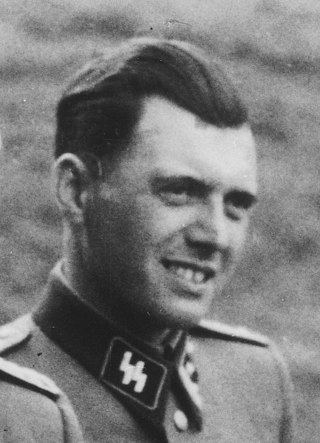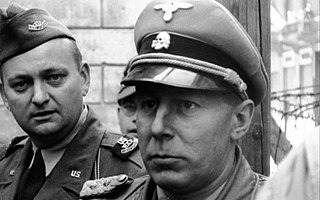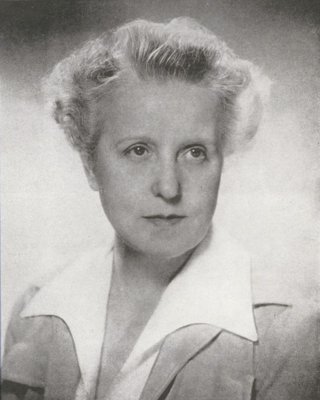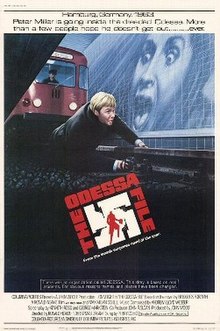
Jonathan Vincent Voight is an American actor. Voight is associated with the angst and unruliness that typified the late-1960s counterculture. He has received numerous accolades, including an Academy Award, a BAFTA Award, and four Golden Globe Awards as well as nominations for four Primetime Emmy Awards. In 2019, he was awarded the National Medal of Arts. Films in which Voight has appeared have grossed more than $5.2 billion worldwide.

Josef Rudolf Mengele was a German Schutzstaffel (SS) officer and physician during World War II. Nicknamed the "Angel of Death", he performed deadly experiments on prisoners at the Auschwitz II (Birkenau) concentration camp, where he was a member of the team of doctors who selected victims to be murdered in the gas chambers, and was one of the doctors who administered the gas.

Maximilian Schell was a Swiss actor. He won the Academy Award for Best Actor for the 1961 American film Judgment at Nuremberg, his second acting role in Hollywood. Born in Austria, his parents were involved in the arts and he grew up surrounded by performance and literature. While he was still a child, his family fled to Switzerland in 1938 when Austria was annexed by Nazi Germany, and they settled in Zürich. After World War II ended, Schell took up acting and directing full-time. He appeared in numerous German films, often anti-war, before moving to Hollywood.
ODESSA is an American codename coined in 1946 to cover Nazi underground escape-plans made at the end of World War II by a group of SS officers with the aim of facilitating secret escape routes, and any directly ensuing arrangements. The concept of the existence of an actual ODESSA organisation has circulated widely in fictional spy novels and movies, including Frederick Forsyth's best-selling 1972 thriller The Odessa File. The escape-routes have become known as "ratlines". Known goals of elements within the SS included allowing SS members to escape to Argentina or to the Middle East under false passports.

Walter (Walther) Rauff was a mid-ranking SS commander in Nazi Germany. From January 1938, he was an aide of Reinhard Heydrich firstly in the Security Service, later in the Reich Security Main Office. He worked for the Federal Intelligence Service of West Germany (Bundesnachrichtendienst) between 1958 and 1962, and was subsequently employed by the Mossad, the Israeli secret service. Recruited by Augusto Pinochet, Rauff played a role in the creation of the Chilean internal security apparatus during the military dictatorship. His funeral in Santiago, Chile, was attended by several former Nazis.

Solomon Perel was a German-born Israeli author and motivational speaker. He was born to a German-Jewish family and managed to escape persecution by the Nazis by masquerading as an ethnic German. His life story is told in the 1990 film Europa Europa which was loosely based on his autobiography Ich war Hitlerjunge Salomon. He also made several visits to various schools to tell his story.
A Nazi hunter is an individual who tracks down and gathers information on alleged former Nazis, or SS members, and Nazi collaborators who were involved in the Holocaust, typically for use at trial on charges of war crimes and crimes against humanity. Prominent Nazi hunters include Simon Wiesenthal, Tuviah Friedman, Serge Klarsfeld, Beate Klarsfeld, Ian Sayer, Yaron Svoray, Elliot Welles, and Efraim Zuroff.

The Odessa File is a thriller by English writer Frederick Forsyth, first published in 1972, about the adventures of a young German reporter attempting to discover the location of a former SS concentration-camp commander.

Simon Wiesenthal was a Jewish Austrian Holocaust survivor, Nazi hunter, and writer. He studied architecture and was living in Lwów at the outbreak of World War II. He survived the Janowska concentration camp, the Kraków-Płaszów concentration camp, the Gross-Rosen concentration camp, a death march to Chemnitz, Buchenwald, and the Mauthausen concentration camp.

William Bemister was a British documentary film maker and journalist.

Sigrid Schultz was a notable American reporter and war correspondent in an era when women were a rarity in both print and radio journalism. Working for the Chicago Tribune in the 1920s, she was the first female foreign bureau chief of a major U.S. newspaper.

Eduard Roschmann was an Austrian Nazi SS-Obersturmführer and commandant of the Riga Ghetto during 1943. He was responsible for numerous murders and other atrocities. As a result of a fictionalized portrayal in the novel The Odessa File by Frederick Forsyth and its subsequent film adaptation, Roschmann came to be known as the "Butcher of Riga".
HIAG was a lobby group and a denialist veterans' organisation founded by former high-ranking Waffen-SS personnel in West Germany in 1951. Its main objective was to achieve legal, economic, and historical rehabilitation of the Waffen-SS.
François Genoud was a noted Swiss financier and a principal benefactor of the Nazi diaspora through the ODESSA escape network and supporter of Middle Eastern militant groups during the post-World War II 20th century.

Otto Adolf Eichmann was a German-Austrian official of the Nazi Party, an officer of the Schutzstaffel (SS), and one of the major organisers of the Holocaust. He participated in the January 1942 Wannsee Conference, at which the implementation of the genocidal Final Solution to the Jewish Question was planned. Following this, he was tasked by SS-Obergruppenführer Reinhard Heydrich with facilitating and managing the logistics involved in the mass deportation of millions of Jews to Nazi ghettos and Nazi extermination camps across German-occupied Europe. He was captured and detained by the Allies in 1945, but escaped and eventually settled in Argentina. In May 1960, he was tracked down and apprehended by Israel's Mossad intelligence agency, and put on trial before the Supreme Court of Israel. The highly publicised Eichmann trial resulted in his conviction in Jerusalem, following which he was executed by hanging in 1962.

The Wehrmacht were the unified armed forces of Nazi Germany from 1935 to 1945. It consisted of the Heer (army), the Kriegsmarine (navy) and the Luftwaffe. The designation "Wehrmacht" replaced the previously used term Reichswehr and was the manifestation of the Nazi regime's efforts to rearm Germany to a greater extent than the Treaty of Versailles permitted.

Aribert Ferdinand Heim, also known as Dr. Death and Butcher of Mauthausen, was an Austrian Schutzstaffel (SS) doctor. During World War II, he served at the Mauthausen-Gusen concentration camp in Mauthausen, killing and torturing inmates using various methods, such as the direct injection of toxic compounds into the hearts of his victims.

The Rose Garden is a 1989 American drama film directed by Fons Rademakers and written by Paul Hengge. The film stars Liv Ullmann, Maximilian Schell, Peter Fonda, Jan Niklas, Hanns Zischler, Alma Almagor as Ruthi and Kurt Hübner. The film was released on December 22, 1989, by Cannon Film Distributors.

Helmuth Groscurth was a German staff and Abwehr officer in the Wehrmacht and a member of the German resistance. As an intelligence officer he was an early proponent of the Brandenburgers, commanded unconventional warfare operations in the Sudetenland, and was an active conspirator against Hitler's agenda. He was later reassigned to the regular army following his criticism of war crimes committed by German forces in Poland. After commanding an infantry battalion in the invasion of France he assumed a variety of staff roles. He was involved in the events of the Bila Tserkva massacre where he attempted to avert the killing of Jewish children.
Max and Helen is a 1990 American drama film directed by Philip Saville and written by Corey Blechman. It is based on the 1982 book Max and Helen by Simon Wiesenthal. The film stars Treat Williams, Alice Krige, Martin Landau, Jonny Phillips, Adam Kotz and Jodhi May. The film premiered on TNT on 8 January 1990.















